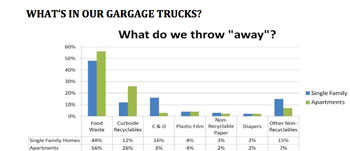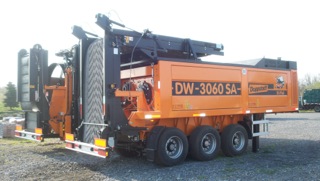Food Scraps Now Allowed in Compost Carts
Ann Arbor residents will now be able to put plate-scrapings in their brown curbside compost collection carts for processing at the city’s composting facility. The city will be providing free counter-top food-scrap storage containers and compost collection carts at a reduced cost to support the initiative.
The city council’s Dec. 16, 2013 decision to provide $64,550 in funding from the solid waste fund for the initiative comes in the context of the council’s recent adoption of an update to the city’s solid waste plan. When the city council adopted the solid waste plan update on Oct. 7, 2013, a modification was made during deliberations.

An inventory of a sample of contents of Ann Arbor garbage trucks showed that about half of the weight is due to food waste. (Chart from the city’s solid waste plan update.)
The amendment undertaken by the council at that meeting eliminated mention of a possible transition to bi-weekly trash pickup or pay-as-you-throw initiatives.
However, one of the recommendations that is thought possibly to lead to a reduction in curbside garbage pickup – which would have been the basis for any decision to reduce the frequency of trash pickup – was left in the plan.
That recommendation was to allow plate scrapings to be placed in residents’ brown composting carts that the city uses to collect yard waste for processing at the city’s composting facility. That facility is operated by a third-party – WeCare Organics. The goal is to reduce the proportion of the city’s landfilled solid waste stream that’s made up of food waste. A recent inventory of the contents of some city trash trucks showed that about half of the weight is made up of food waste.
[Waste Less: City of Ann Arbor Solid Waste Resource Plan.] [Appendices to Waste Less] [Previous Chronicle coverage: "Waste as Resource: Ann Arbor's Five Year Plan."]
The $64,550 allocation from the solid waste fund balance break down this way:
- $14,950 for an increased level of service from WeCare Organics at the compost processing facility (daily versus weekly grinding). The city is estimating no increased net cost for this increased service based on a reduction in landfill tipping fees. The city pays $25.90 per ton for transfer and disposal of landfilled waste. That’s $7.90 more than the city pays WeCare organics ($18 per ton) for processing compostable material. City staff is estimating that the program will divert 2,100 tons from the $25.90 category – for a savings of 2,100*$7.90=$16,590.
- $24,600 for the cost of 6,000 Sure-Close counter-top containers the city plans to give away to residents to encourage the initial separation of plate scrapings from garbage.
- $25,000 for a subsidy to sell an estimated 1,000 additional brown compost carts to residents at a cost of $25 per cart instead of $50 per cart. About 12,000 carts are already in use.
The city’s curbside compost collection program runs April through November. The Dec. 16 city council funding decision did not extend the timeframe for that program.
For details about the council’s deliberations on this item, see The Chronicle’s live updates from the Dec. 16 meeting.
This brief was filed from the city council’s chambers on the second floor of city hall located at 301 E. Huron. A more detailed report will follow: [link]




